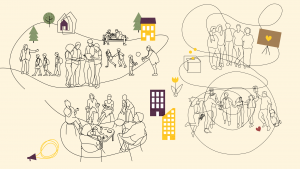What Hungary’s civil society funding crisis can teach us
15 Jul 2025
This piece originally appeared on the LinkedIn page of György Hámori.

György Hámori, Roots and Wings Foundation
Over the past five years, I have worked at the Roots and Wings Foundation, where we have had the rare opportunity to develop our own funding programmes to support local civil society in Hungary — using flexible, partnership-based models. In Hungary’s small support ecosystem, there are organizations who redistribute public international funds, such as from the EU, EEA or US government sources. We are all part of the same fragile ecosystem, each playing a different role, but sharing a common responsibility: to ensure that the ways we support civil society are effective, fair and sustainable.
In an earlier post, I reflected on the international funding landscape and its implications for Hungary and the wider Central and Eastern European region. Now, I would like to turn inward. After participating in a recent gathering hosted by Civil Kollégium Alapítvány in Kunbábony, I have been thinking more about the internal dynamics of Hungarian civil society — and what lessons they might offer for other countries where civic space is shrinking or where significant new funding might soon arrive.
One such opportunity has emerged: a major new financial resource is set to flow into Hungary. But unless we reflect critically on how support is currently structured, that resource might reinforce familiar shortcomings rather than address them. I share these reflections in the hope of helping us move forward — with greater clarity, resilience and shared responsibility.
A fragmented field under pressure
Hungary has around 60,000 registered NGOs. A significant portion of these exist mostly on paper. Many operate in apolitical fields or provide valuable services without engaging deeply with questions of democracy, rule of law, or civic participation.
The government’s strategy is subtle and devastating: not overt bans or shutdowns, but a campaign of financial strangulation and administrative pressure. The goal is clear: silence through suffocation.
Structural weaknesses we must confront
Many of the challenges we face are not solely the result of political interference — they are also rooted in the sector’s own vulnerabilities:
- Few NGOs have built endowments, savings, or real estate assets that offer long-term stability.
- Over-reliance on foreign funding (especially state / EU sources) has meant that many NGOs never developed a strong base of domestic supporters.
- Financial literacy, long-term planning and strategic fundraising capacities are often underdeveloped.
- Corporate giving remains cautious and limited — often tied to personal connections, and rarely part of a broader strategic vision. In a politically influenced economy, companies may hesitate to support anything perceived as controversial.
- Meanwhile, many citizens are used to receiving free services — not only from the state, but from civil society as well. While some organizations are now building stronger community ties, this takes time, trust, and infrastructure.
The cost of survival
These dynamics shape how many NGOs operate today. Too often, they are:
- Understaffed or reliant on short-term project funding.
- Pushed to pursue grants that don’t fully align with their mission.
- Led by exhausted professionals or passionate volunteers working without enough support.
- Locked in cycles of reporting and compliance, leaving little space for reflection or long-term strategy.
The result is a civil society that often survives, but struggles to grow or lead. That reacts to crises, but is rarely resourced to shape the future.
“Those working every day for community, dignity and democracy deserve support systems that match their courage.”
A glimpse of hope — or a warning?
On the same day we gathered in Kunbábony, the Ökotárs Foundation (the Hungarian Environmental Partnership Foundation) announced that it had won a major new grant from the Norwegian EEA Funds. Over the next six years, around 20 million Euros will be redistributed to Hungarian civil society.
This is welcome and much needed — but also a moment to reflect.
If we continue with rigid application procedures, inflexible timelines, and a lack of core support, this funding may not bring the transformative impact the sector needs. It could help some organizations survive — but fall short of building a more sustainable and self-sufficient civil society.
The recent CERV (EU) funding round offers a cautionary tale. Hungarian intermediary organizations, fearing political scrutiny, applied even stricter rules than the EU itself. As a result, few applicants qualified in the initial round, and the requirements have reportedly posed serious implementation challenges — with some organizations struggling to comply or sustain their projects.
What must change
We cannot afford to repeat past mistakes. Instead, we must:
- Prioritize core support — flexible, long-term, trust-based funding that enables organizations to plan and grow.
- Develop domestic donor networks — even small ones, rooted in community support.
- Invest in financial literacy and internal capacity building.
- Pool resources and share risks. A shared reserve fund — like our Future Fund initiative — could provide a buffer in uncertain times.
- Reclaim the public narrative around civil society, and articulate clearly why it matters.
Hungary is not alone. Many of these challenges — shrinking civic space, donor fatigue, rigid compliance — are visible in other regions, including the Global South. As new resources begin to flow, we must ensure they are used wisely.
At Roots and Wings, we’ve seen firsthand how core funding builds not only stability, but also trust, courage and strategic clarity — allowing local organizations to grow in ways that project-based support rarely permits.
Where do we go from here?
The time for cosmetic change is over. We need courageous funders — and courageous self-reflection. The strength of civil society lies in our solidarity, imagination and ability to speak honestly about what’s not working.
These thoughts come from a place of commitment — not criticism for its own sake, but a desire to see our sector thrive. Those working every day for community, dignity and democracy deserve support systems that match their courage.
What has worked in your country or community? What would you do differently? Let’s talk.
By: György Hámori, Program and Partnerships Manager at the Roots and Wings Foundation.


